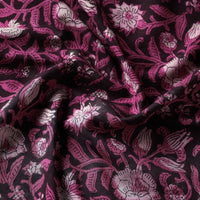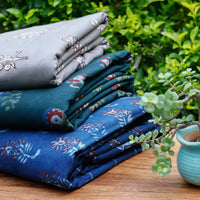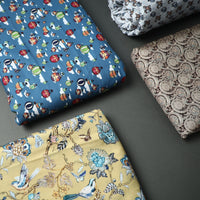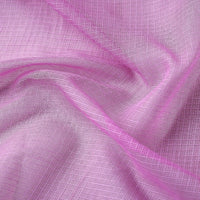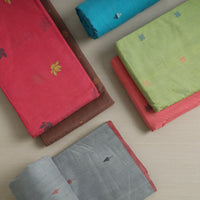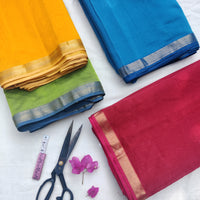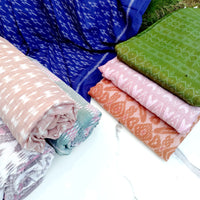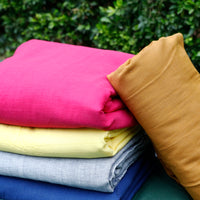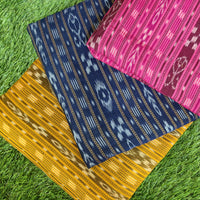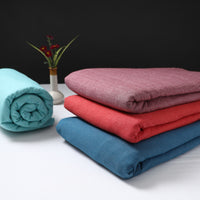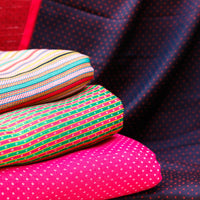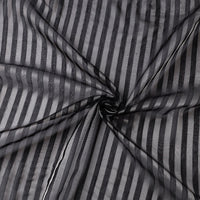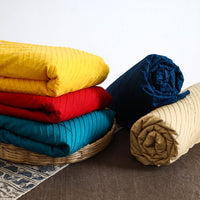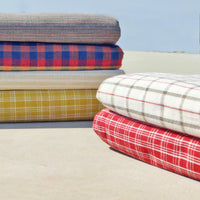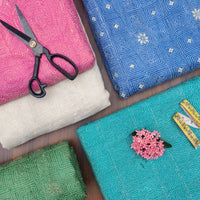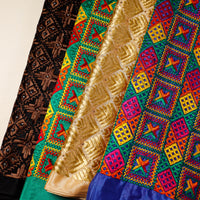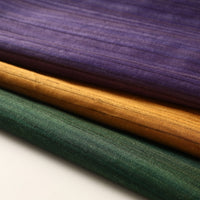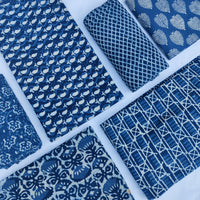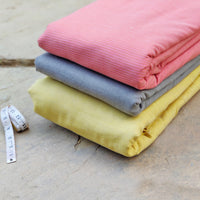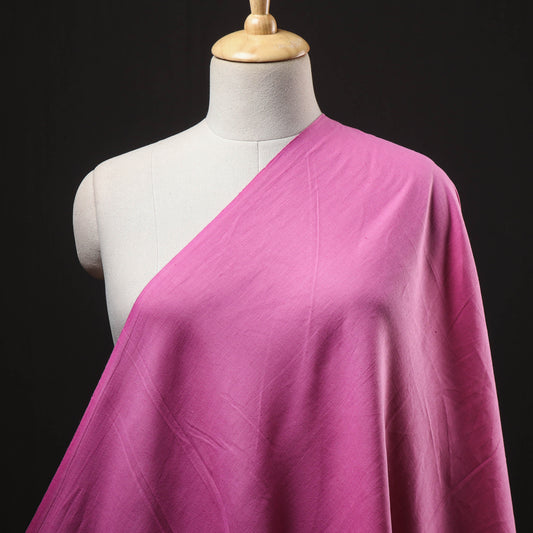Explore the Rich Tapestry of Indian Textiles at iTokri
Introduction: A Journey Through India’s Textile Heritage
At iTokri, we believe that every fabric is more than just material—it's a story, a tradition, a piece of art woven with care and precision. Our online store is a treasure trove of handcrafted textiles from the diverse and culturally rich regions of India. By connecting you with these exquisite fabrics, we aim to share the beauty and depth of India’s artisanal heritage with the world, while supporting the artisans who dedicate their lives to keeping these traditions alive.
Regional Textiles: Weaving Culture Into Fabric
India is a land of diverse cultures, each with its own unique textile tradition. At iTokri, our collection reflects this diversity, offering you a chance to explore and own a piece of India's rich cultural tapestry.
-
The Weaves of Varanasi: Banarasi Silk Varanasi, also known as Banaras or Kashi, is famed for its Banarasi silk, a fabric that has adorned royalty for centuries. Woven on traditional handlooms, Banarasi silk is renowned for its intricate zari work, where fine gold and silver threads are interwoven to create rich, opulent designs. Each saree or fabric length can take weeks or even months to complete, depending on the complexity of the pattern. The weavers of Varanasi, often from families who have been in the trade for generations, carry forward this age-old craft with pride and precision.
-
Kutch’s Ajrakh: The Art of Block Printing In the arid landscapes of Kutch, Gujarat, lies the village of Ajrakhpur, where the ancient craft of Ajrakh block printing thrives. This technique, which dates back to the Indus Valley Civilization, uses natural dyes and complex geometric patterns that require up to 16 steps to complete. The motifs often symbolize elements of nature, such as the stars, flowers, and rivers, reflecting the artisan’s connection to the environment. The Khatri community of Kutch has been the custodian of this craft, passing down the skills from generation to generation. When you buy an Ajrakh fabric from iTokri, you're not just purchasing a piece of cloth; you're investing in a tradition that has endured for thousands of years.
-
The Magic of Madhya Pradesh: Chanderi Chanderi, a small town nestled in the heart of India, is synonymous with light, gossamer-like fabrics that are a blend of silk and cotton. The Chanderi fabric is known for its sheer texture, glossy transparency, and the inclusion of intricate motifs, often inspired by nature or ancient temples. This weaving tradition dates back to the Vedic period and has been nurtured by generations of weavers, particularly the Muslim Julaha community. Their dedication to their craft has ensured that Chanderi continues to be a fabric of choice for special occasions and festivals. By choosing Chanderi from iTokri, you’re supporting these artisans and helping preserve this delicate craft.
The People Behind the Craft: Stories of Resilience and Tradition
At the heart of every fabric at iTokri are the artisans—the men and women whose skilled hands and creative minds bring these textiles to life. Each region has its own community of craftsmen, each with a story that is as rich and varied as the fabrics they produce.
-
Rameshwar and the Legacy of Patola The Salvi family of Patan, Gujarat, is one of the last remaining practitioners of the Patola weaving technique, a double ikat method that is incredibly complex and time-consuming. It is said that a single Patola saree can take anywhere from six months to a year to complete. Rameshwar Salvi, a master weaver, recalls how his father and grandfather taught him the craft, a tradition that has been in their family for over 900 years. Despite the challenges of modernization and the decline in demand, Rameshwar continues to weave, driven by a deep love for the craft and a desire to keep his heritage alive. When you purchase a Patola fabric from iTokri, you’re not just buying a saree—you’re preserving a legacy.
-
The Women of Bhujodi: Guardians of the Loom In the village of Bhujodi, near Bhuj in Gujarat, the Vankar community has been weaving woolen shawls and blankets for generations. Traditionally, the men work the looms while the women spin the yarn. However, in recent years, women have also started taking up weaving, driven by a desire to contribute to the family income and keep the craft alive. Lajwanti, a weaver in her late 30s, speaks of the satisfaction she feels when her creations are sold through platforms like iTokri. "Yahan humari mehnat ko pehchaan milti hai," she says, highlighting how the recognition of their work has empowered many women in the community.
The Cultural Significance of Indian Textiles
Indian textiles are not just about aesthetics—they hold deep cultural and symbolic meanings. The motifs, colors, and techniques often reflect the beliefs, rituals, and stories of the region from which they originate.
-
Symbolism in Kalamkari Kalamkari, an ancient form of hand-painting on fabric, often depicts scenes from Hindu mythology, such as stories from the Ramayana and Mahabharata. These fabrics were historically used as temple hangings or for wrapping sacred texts. The artists, known as Chitrakars, use a bamboo stick with a piece of cloth wrapped around it as a brush, dipping it into natural dyes made from roots, leaves, and minerals. The craft is deeply intertwined with the spiritual and religious life of the community, making each piece of Kalamkari fabric not just a piece of art, but a narrative steeped in tradition.
-
The Social Fabric of Indian Handlooms Handlooms in India are a vital part of the rural economy, providing livelihoods to millions of weavers across the country. These textiles are often produced in cooperative societies or small family units, where each member has a specific role to play—from spinning and dyeing the yarn to weaving and finishing the fabric. The sense of community is strong, with knowledge and skills passed down through generations. By supporting handloom products from iTokri, you are directly contributing to the sustenance of these communities and the preservation of their traditional way of life.
Why iTokri? Ethical, Sustainable, and Authentic
iTokri is more than just an online store—it’s a movement towards sustainable and ethical fashion. We work directly with artisans, ensuring they receive fair wages and that their craft is respected and valued. Our commitment to sustainability is reflected in our eco-friendly packaging, which uses recycled and biodegradable materials, minimizing our impact on the environment.
We also believe in transparency and authenticity. Every product on our site comes with detailed information about its origin, the techniques used, and the artisans who made it. This not only helps you make informed choices but also creates a connection between you and the artisans—a connection that goes beyond a mere transaction.
Conclusion: A Call to Action
We invite you to explore our collection of handcrafted fabrics and textiles. Whether you’re looking for something unique to wear, a special gift, or simply want to support traditional crafts, iTokri has something for everyone. Dive into the world of Indian textiles and discover the beauty of handmade with iTokri.
Shop Now and be a part of the iTokri community that values craftsmanship, sustainability, and cultural heritage. Together, let’s keep these beautiful traditions alive.
Frequently Asked Questions (FAQ)
1. What types of fabrics are available at iTokri?
Answer: iTokri offers a diverse range of fabrics, each reflecting India’s rich textile heritage. Our collection includes:
-
Cotton Fabrics: Soft, breathable, and perfect for everyday wear or home décor.
-
Handloom Textiles: Fabrics made using traditional handloom techniques, known for their durability and unique texture.
-
Silk Fabrics: Luxurious and elegant, ideal for special occasions or crafting high-end garments.
-
Block-Printed Fabrics: Featuring intricate designs created using hand-carved wooden blocks, a craft that is centuries old.
-
Organic Fabrics: Environmentally friendly options made from natural fibers grown without harmful chemicals.
We carefully curate our collection to ensure that each fabric is of the highest quality and offers something unique, whether you're designing clothes, home décor, or other creative projects.
2. How do I care for my handloom or block-printed fabrics?
Answer: Proper care is essential to maintain the beauty and longevity of handloom and block-printed fabrics. Here are some tips:
-
Washing: Always wash these fabrics by hand in cold water with a mild, phosphate-free detergent. Avoid using bleach or harsh chemicals as they can damage the fibers and fade the colors.
-
Drying: Air dry in the shade to prevent direct sunlight from causing colors to fade. Avoid wringing the fabric to prevent stretching or misshaping.
-
Ironing: Use a low to medium heat setting when ironing. It’s best to iron the fabric while it’s still slightly damp to achieve a smooth finish without scorching.
-
Storage: Store your fabrics in a cool, dry place. For long-term storage, wrap the fabric in muslin or cotton cloth to protect it from dust and moisture.
3. Are iTokri’s fabrics eco-friendly?
Answer: Yes, iTokri is committed to sustainability. Many of our fabrics are eco-friendly, made from organic cotton, natural dyes, and other sustainable materials. We prioritize working with artisans who use traditional methods that are kind to the environment, such as handloom weaving and natural dyeing processes. This ensures that our products not only look beautiful but also have a minimal environmental impact.
4. How does iTokri support local artisans?
Answer: iTokri is deeply committed to supporting the artisans who make our fabrics. Here’s how we do it:
-
Fair Trade Practices: We work directly with artisans, ensuring they receive fair wages and are compensated fairly for their craftsmanship.
-
Sustaining Traditional Crafts: By offering a platform for these artisans to sell their products, we help preserve traditional crafts that might otherwise be lost.
-
Community Support: Many of the artisans we work with are from small, rural communities. Our partnerships help sustain these communities by providing stable income and promoting economic growth.
5. Can I purchase fabrics in bulk for my business or project?
Answer: Absolutely! iTokri offers bulk purchasing options, making it easy for designers, businesses, and DIY enthusiasts to source high-quality fabrics for larger projects. Whether you need fabric for clothing lines, home décor, or crafting, we can accommodate bulk orders. To place a bulk order, simply contact our customer service team with your requirements, and we’ll be happy to assist you with pricing, availability, and delivery options.
6. What is the difference between handloom and machine-made fabrics?
Answer: Handloom fabrics and machine-made fabrics differ significantly in their production process, texture, and overall quality:
-
Handloom Fabrics: These are woven manually on a loom without the use of electricity. Each piece is unique, often showing slight variations that add to its charm. Handloom fabrics are typically softer, more breathable, and have a richer texture due to the slow and careful weaving process.
-
Machine-Made Fabrics: These are produced on powered machines, which can manufacture large quantities quickly. Machine-made fabrics tend to be more uniform, with fewer imperfections, but they may lack the unique character and artisanal quality of handloom fabrics.
Choosing between the two depends on your preference for either handcrafted uniqueness or the uniformity and efficiency of machine-made fabrics.
7. What makes iTokri different from other online fabric stores?
Answer: iTokri stands out for several reasons:
-
Authenticity: We offer exclusively handcrafted fabrics sourced directly from artisans, ensuring that each piece is authentic and of the highest quality.
-
Cultural Heritage: Our fabrics are more than just materials; they are pieces of India’s cultural heritage, crafted using techniques passed down through generations.
-
Sustainability: We are committed to eco-friendly practices, from the sourcing of our fabrics to our packaging materials.
-
Artisan Support: By purchasing from iTokri, you are directly supporting local artisans and helping to preserve traditional crafts.
-
Personalized Service: Our customer service team is dedicated to helping you find the perfect fabric for your needs, offering personalized assistance and expert advice.
8. How can I be sure of the quality of the fabrics I’m purchasing?
Answer: At iTokri, quality is our top priority. Here’s how we ensure you receive only the best:
-
Curated Collections: Every fabric we offer is carefully selected by our team of experts, who have extensive knowledge of textiles and craftsmanship.
-
Artisan Partnerships: We work directly with artisans who have a reputation for excellence in their craft. This direct partnership allows us to maintain strict quality control over the products we offer.
-
Detailed Product Descriptions: We provide comprehensive product descriptions and high-resolution images on our website, so you can see the fabric’s details before making a purchase.
-
Customer Reviews: Many of our products come with customer reviews, giving you additional insight into the quality and satisfaction of other buyers.
9. How long does shipping take, and do you offer international shipping?
Answer: Yes, we offer international shipping to many countries, including the US, UK, Canada, and more. Shipping times vary depending on your location:
-
Within India: Orders typically arrive within 5-7 business days.
-
International Shipping: Delivery times can range from 10-15 business days, depending on the destination and customs processing times.
We use reliable courier services to ensure your order arrives safely and on time. You’ll receive a tracking number once your order is dispatched, so you can monitor its progress. Please note that international customers may be responsible for customs duties and taxes, depending on your country’s regulations.
10. What is iTokri’s return and exchange policy?
Answer: We want you to be completely satisfied with your purchase from iTokri. If for any reason you are not, we offer a hassle-free return and exchange policy:
-
Returns: If you’re not happy with your fabric, you can return it within 15 days of delivery for a full refund, provided the fabric is in its original condition (unwashed, uncut, and unused).
-
Exchanges: If you’d like to exchange your fabric for a different one, simply contact our customer service team, and we’ll guide you through the process.
-
Refund Process: Once we receive the returned fabric, we will process your refund within 7-10 business days.
iTokri भारतीय कपड़ों की विविधता और धरोहर को समर्पित एक ऑनलाइन प्लेटफॉर्म है, जहां हर कपड़ा सिर्फ एक वस्त्र नहीं बल्कि एक कहानी है। यह प्लेटफॉर्म भारत के विभिन्न क्षेत्रों की पारंपरिक हस्तशिल्प से बने कपड़ों का संग्रह प्रस्तुत करता है, जिससे ग्राहकों को भारतीय संस्कृति और कला के करीब लाया जाता है।
iTokri के संग्रह में बनारस का बुनाई से बना बनारसी सिल्क, कच्छ के अजरख प्रिंट, मध्य प्रदेश का चंदेरी, और गुजरात के पटोला जैसे विभिन्न क्षेत्रों की खासियत वाले कपड़े शामिल हैं। यह कपड़े न केवल उनकी सुंदरता के लिए मशहूर हैं, बल्कि इनके पीछे की मेहनत और संस्कृति को भी दर्शाते हैं।
कपड़ों के साथ ही iTokri उन कारीगरों की कहानियों को भी सामने लाता है, जिन्होंने इन शिल्पों को पीढ़ियों से जिंदा रखा है। जैसे कि पाटन, गुजरात के सल्वी परिवार की पटोला बुनाई और भुजोडी के वंकर समुदाय की बुनाई का समर्थन किया जा रहा है। iTokri का उद्देश्य न केवल इन हस्तशिल्पों को संरक्षित करना है बल्कि उन कारीगरों को भी एक स्थिर आजीविका प्रदान करना है जो इस कला में लगे हुए हैं।
iTokri की पहचान उसके नैतिक, टिकाऊ और पारदर्शी तरीकों से होती है। यह प्लेटफॉर्म ग्राहकों को उच्च गुणवत्ता वाले, हस्तनिर्मित और पारंपरिक कपड़ों को अपनाने के लिए प्रोत्साहित करता है, जिससे न केवल उनकी शैली में एक अद्वितीयता आती है बल्कि कारीगरों का भी समर्थन होता है।
iTokri पर खरीदार एक व्यापक संग्रह से चुन सकते हैं और इस प्रक्रिया में भारतीय हस्तशिल्प और परंपराओं को जिंदा रखने में योगदान दे सकते हैं।

















